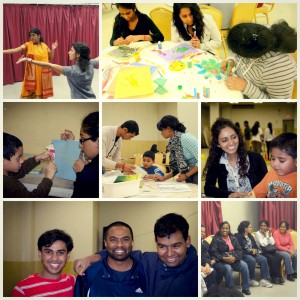By @thesaaac
 There is a collective unease about group homes in the South Asian community, especially in the case of admitting individuals with special needs. The discussions the South Asian Autism Awareness Centre (SAAAC) had with various families about group homes reveal mistrust for such institutions.
There is a collective unease about group homes in the South Asian community, especially in the case of admitting individuals with special needs. The discussions the South Asian Autism Awareness Centre (SAAAC) had with various families about group homes reveal mistrust for such institutions.
Additionally, there is a belief that by admitting an individual to a group home one is being disloyal and upsetting traditional family values. Yet, group homes are vital community institutions that offer support and guidance to many families. By not utilizing and stigmatizing such services, families who are ill-equipped to handle vulnerable family members risk not only endangering themselves, but also those who they care for.
READ PART ONE OF THIS STORY HERE.
In Part 2 of our story, Sita and her son, who has a severe form of autism, begin the lengthy process of finding space at a group home.
 Though Sita had decided to admit her son into a group home, she continued to drag her feet about the process. The disappointment of her family and friends weighed on her, but more forcefully, her personal guilt prevented her from taking the necessary measures to admit her son into a group home.
Though Sita had decided to admit her son into a group home, she continued to drag her feet about the process. The disappointment of her family and friends weighed on her, but more forcefully, her personal guilt prevented her from taking the necessary measures to admit her son into a group home.
“There is always that part of you that thinks the situation can change,” said Sita. “I felt like maybe I could somehow change and handle all of this.” But that never turned out to be the case, and one night Sita was pushed into action when her son got out of hand. He began striking the mother and sister violently, and began damaging the home. Sita was forced to call the police. Later that night, she and her son found themselves at a psychiatric ward of a prominent Toronto hospital.
“My son was admitted and we stayed there for a few months,” said Sita. “I could not take him home and had requested the hospital to help in finding him a home.”
Sita soon found out how long the process was to get admittance into a group home. With incredibly long waitlists, some families in the province of Ontario had to wait for years. Though, Sita had found incredible support at the hospital. Doctors and social workers saw and empathized with her dire situation, but finding a space for her son was going to take time.
For 6 months, Sita commuted between the hospital and her home. At times spending 3-4 days straight in the hospital with her son, coming home to only shower and check up on her daughter who she had left in the care of very close friends.
During their stay at the hospital, Sita and her son had been paired with a social worker, provided by the hospital, and Sita had the freedom to bring in consultants she believed could help her in the process. Representatives from the South Asian Autism Awareness Centre (SAAAC) were able to be part of a team that helped Sita understand the process of finding a space for her son. 
“I don’t think anyone should go through this alone,” said Sita reflecting. “I was fortunate to have some great professionals guiding and educating me. I recommend if you were like me and had no idea where to start, begin by visiting a family doctor or even walking into a hospital and asking about options. There are some great community organizations that will help you begin this process too.”
After 6 months of constant pressure applied by the hospital on various mental health institutions, a space opened up for Sita’s son at a small group home in Toronto. Though Sita knew she was extremely lucky to get a space in such a short time, she still wanted to examine the institution where her son would begin his new life.
“I wanted to make sure this was the right place for my son,” said Sita. “Some of the key things I looked for was if the staff were caring and encouraging, and if they seemed to have experience handling individuals like my son who presented a lot of challenges. I also looked to see if the appearance of the home was clean. My son always grew up in an orderly and neat environment, and I wanted that standard to be upheld – this would also show me that the people running the group home cared about their services. And one of my biggest fears was my son being locked away and not being able to participate in daily life, but this particular group home had great opportunities to get out into the community – to see movies or eat at restaurants and other daily group outings and activities.”
When Sita was satisfied with the environment, personnel and programming of the group home, she quickly realized the significance of her next step, admitting her son.
“I went through a 6 month process of finding a group home. I never thought of the end result of all of this. I was focusing on the day to day things of taking care of my son. But when that moment came to finally admit my son, I was in shock.”
The goodbye was painful for Sita. Her son earlier in the day had attacked personnel at the group home and had not stopped screaming since the morning. But early into the evening he had fallen asleep. Sita took this time to sit with her son, watching him in a rare state of peace. She said her goodbye in the silence of the evening, saying a little prayer and kissing him on the cheek. She soon made her way out of the building with a few friends. As she tried to muffle her sobs on the car ride home, she knew that her son and her family would benefit from this decision – painful as it was.
©masalamommas and masalamommas.com, 2016-2017. Unauthorized use and/or duplication of this material without express and written permission from this site’s author and/or owner is strictly prohibited. Links may be used, provided that full and clear credit is given to masalamommas.com and Masalamommas online magazine with appropriate and specific direction to the original content.



There are no comments
Add yours